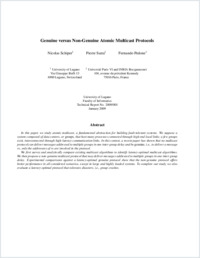Genuine versus non-genuine atomic multicast protocols
- Schiper, Nicolas Facoltà di scienze informatiche, Università della Svizzera italiana, Svizzera
- Sutra, Pierre Université Paris VI and INRIA Rocquencourt, Paris, France
- Pedone, Fernando Facoltà di scienze informatiche, Università della Svizzera italiana, Svizzera
-
2009
11 p.
English
In this paper, we study atomic multicast, a fundamental abstraction for building fault-tolerant systems. We suppose a system composed of data centers, or groups, that host many processes connected through high-end local links; a few groups exist, interconnected through high-latency communication links. In this context, a recent paper has shown that no multicast protocol can deliver messages addressed to multiple groups in one inter-group delay and be genuine, i.e., to deliver a message m, only the addressees of m are involved in the protocol. We first survey and analytically compare existing multicast algorithms to identify latency-optimal multicast algorithms. We then propose a non-genuine multicast protocol that may deliver messages addressed to multiple groups in one inter-group delay. Experimental comparisons against a latency-optimal genuine protocol show that the non-genuine protocol offers better performance in all considered scenarios, except in large and highly loaded systems. To complete our study, we also evaluate a latency-optimal protocol that tolerates disasters, i.e., group crashes.
- Language
-
- English
- Classification
- Computer science and technology
- License
-
License undefined
- Open access status
- green
- Identifiers
-
- RERO DOC 22106
- ARK ark:/12658/srd1318269
- Persistent URL
- https://n2t.net/ark:/12658/srd1318269
Statistics
Document views: 176
File downloads:
- Texte intégral: 176
